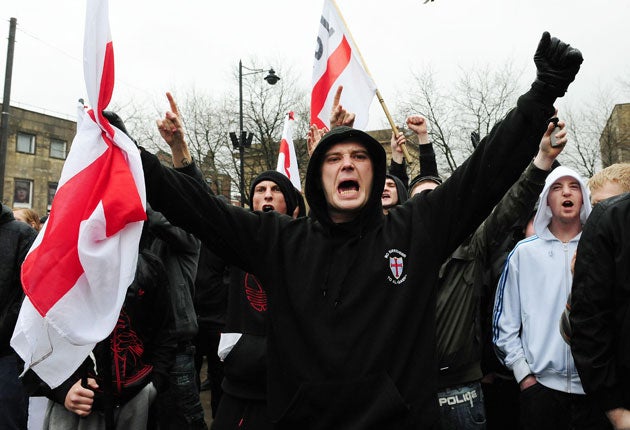Police blame anti-fascists for violence
Protesters at English Defence League rally reject blame for violence

Anti-fascist protesters have been blamed by police for provoking the violence which broke out as a controversial organisation campaigning against the spread of Islam attempted to hold a rally.
Several people were hurt, including at least two police officers, and 74 people were arrested as the group Unite Against Fascism (UAF) protested on Saturday against the English Defence League (EDL) rally in Bolton, Lancashire. Assistant Chief Constable Garry Shewan, from Greater Manchester Police (GMP), accused UAF supporters of deliberately inciting violence and attacking officers who were trying to keep the two sides apart.
"We have seen groups of people, predominantly associated with the UAF, engaging in violent confrontation," he said. "It is clear to me that a large number have attended with the sole intention of committing disorder and their actions have been wholly unacceptable. They acted with, at times, extreme violence and their actions led to injuries to police officers, protesters and members of the public.
"The police are not and should not be the target of such violence and anger, and this protest and the actions of some of the protesters is roundly condemned by GMP and by Bolton Council."
Mr Shewan was also critical of the EDL which he condemned for flag-waving and "vitriolic name-calling". Once the rally was over, police escorted them to bus and railway stations while EDL supporters chanted: "We want our country back."
A spokesman for the anti-fascist contingent, however, denied there had been any intention to cause violence and said the police had been hostile from the start."They sent riot squads into a peaceful demonstration and that's how the violence happened," he said. "They treated the EDL with kid gloves. We don't accept the police account at all and are very concerned about the nature of the policing and would like to see some kind of investigation."
Greater Manchester Police and political leaders from Bolton Council had last week appealed in vain to Alan Johnson, the Home Secretary, to ban the rally and protest because they feared there would be violence. Of the 74 people arrested during the demonstrations, at least 55 were thought to be from the anti-fascist group, with nine being of EDL supporters.
Virtually all those arrested were later released without charge. One of the few exceptions was Weyman Bennett, a senior member of the UAF, who was arrested at the start of the demonstration and was charged with conspiracy to organise violent disorder.
An estimated 2,000 people attended the rally by the EDL, a "patriotic" group which maintains it is non-racist but is vehemently against the spread of Islam which it describes as "a vile and virulent ideology based on 7th-century barbarity, intolerance, hatred, subjugation and war".
They were challenged in Bolton's Victoria Square by an estimated 1,500 UAF supporters who regard the EDL as a racist group on the extreme right and a sister organisation of the British National Party.
A further 1,500 anti-fascists were said by the UAF to have travelled to Bolton but were kept away from the square where the rally and protest were held. Prior to the demonstration, both groups agreed to stay in separate designated areas in front of the town hall, separated by steel barriers, but some were said to have tried to smash through the barricades.
Of the people who were injured during the violence, one was a man who was taken to hospital for treatment to a head injury, and another was a 16-year-old girl who suffered from a panic attack during the protest.
